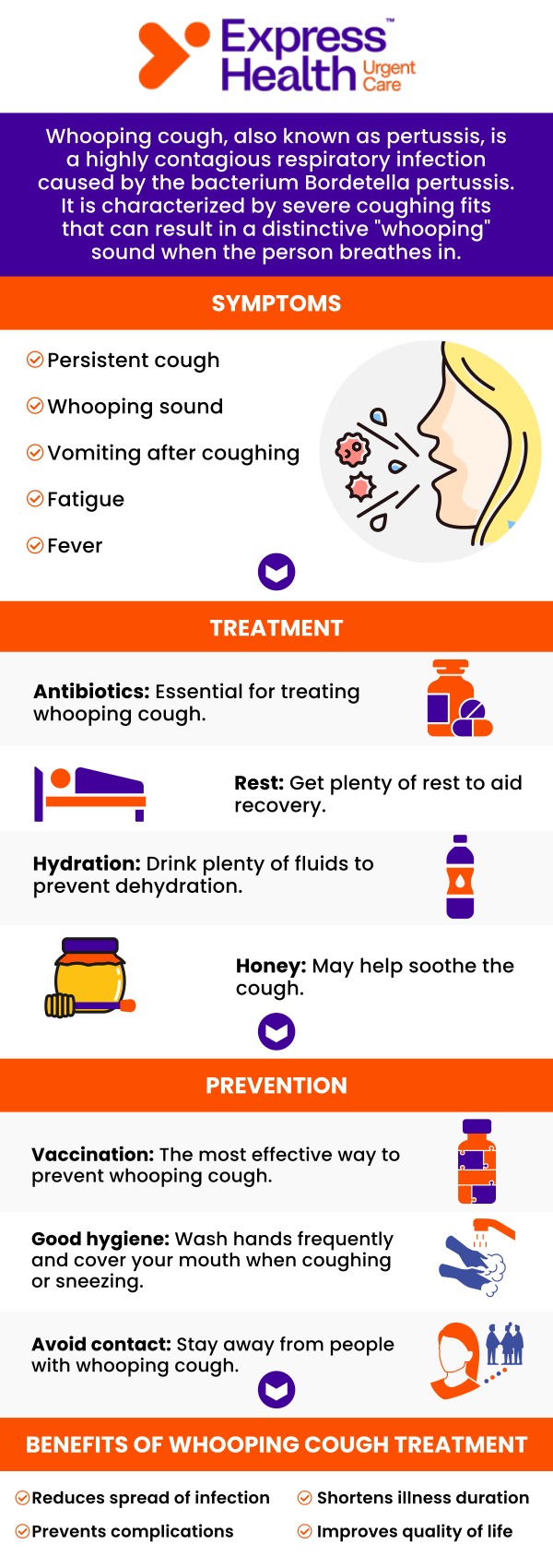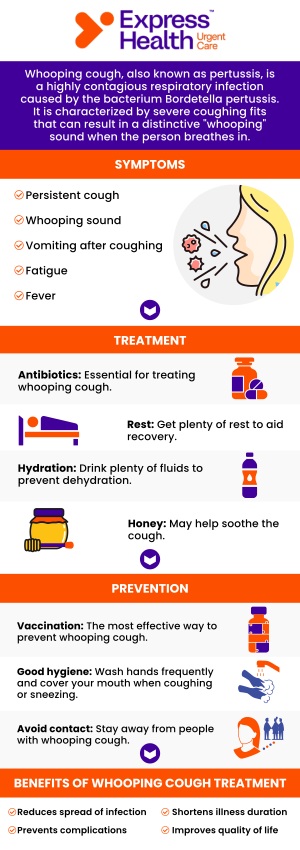Urgent Care for Whooping Cough Treatment Q&A
If you are noticing signs of a persistent and consistent cough, whooping cough may be the reason. Don’t ignore this persistent cough. Early detection and treatment are crucial to prevent the spread of this highly contagious disease. Protect yourself and your loved ones by seeking immediate medical attention at Express Health Urgent Care. For more information, contact us or book an appointment online. We have convenient locations in East Harlem, NY, Metropolitan, NY, and Staten Island, NY.




Table of Contents:
How do you know if you have whooping cough?
What are the 3 stages of whooping cough?
Will whooping cough go away by itself?
When to see a doctor for whooping cough?
Whooping cough, also known as pertussis, is very contagious, is a respiratory tract infection, and is usually recognized by a severe hacking cough followed by a high-pitched intake of breath that sounds like a whoop. It primarily affects children who have not completed the full round of vaccinations. Adults and teenagers can also be affected by whooping cough if their immunity has faded.
The three stages of whooping cough are catarrhal, paroxysmal, and convalescent. Symptoms in the catarrhal stage do not last long and can even go unnoticed.
Stage 1: Catarrhal
Noticeable characteristics:
• Coryza
• Low-grade fever
• A mild, occasional cough
• Apnea
The paroxysmal stage is coughing with a whooping sound when breathing. The convalescent stage is where the symptoms improve, and the coughing is less frequent.
Stage 2: Paroxysmal
Noticeable characteristics:
• Paroxysms of rapid, numerous coughs due to difficulty expelling thick mucus from the tracheobronchial tree
• Long inspiratory effort accompanied by a noticeable high-pitched “whoop” at the end of paroxysms
• Cyanosis
• Vomiting Exhaustion
These attacks in this stage can be quite frequent at night, and on average, 15 attacks per 24 hours are seen. The attacks will increase in frequency during the first 1-2 weeks, will remain at the same frequency for 2-3 weeks, and will begin to gradually decrease
Stage 3: Convalescent
Noticeable characteristics:
• Gradual recovery
• Less noticeable and constant paroxysmal coughs, which will disappear within 2-3 weeks
With the use of the vaccine, the cases of whooping cough(pertussis) have declined, and only certain areas have had outbreaks in recent years.
Whooping cough can last up to 10 weeks and may lead to pneumonia or other complications, although the bacteria can die off naturally after about three weeks and, at this time, will no longer require antibiotics. Antibiotics can be used for those who are in close contact to help prevent or lessen the symptoms. Symptoms can start with a runny or stuffy nose, low-grade fever, occasional cough, and pauses in breathing. These early symptoms can appear to be common colds, and doctors may not diagnose until the symptoms become more severe. For further assistance and to feel better, you can also visit our walk-in urgent care clinic.
Between one and two weeks after the symptoms start, people will develop paroxysms, a rapid uncontrolled coughing fit, which can lead to a high-pitched whoop sound that can make you vomit and struggle to breathe. These fits can also make you feel very tired but can make you feel well in between coughing fits. After 10 weeks, your symptoms will lessen, but it is best to see a doctor for a diagnosis and antibiotics to help alleviate the symptoms sooner.
At about one to two weeks, the cough will become more severe, and coughing spells could last longer than one minute. Babies younger than six months to preschool age are at the most risk since they have not had their full dose of the vaccination. Children receive 4 doses in total: one at 2 months, 4 months, 6 months, and 18 months, and then receive a booster between the ages of 4 and 6.
If your child has a blue tinge to their skin, usually around the mouth and fingertips, they stop breathing, have a high fever along with seizures, vomit often, and become dehydrated, you should see a doctor or go to the emergency room. You will most likely be admitted to the hospital for fluids and antibiotics. For more information, call us or book an appointment online. We have convenient locations in East Harlem, NY, Metropolitan, NY, and Staten Island, NY. We serve patients from East Harlem, Manhattan, Brooklyn, Williamsburg, Greenpoint, Staten Island, Rossville, Tottenville, the Metropolitan New York City area, and surrounding neighborhoods in NY.


Additional Services You May Need
▸ Broken Bone and Fractures
▸ Chronic Disease Management
▸ COVID-19 Testing
▸ DMV Vision Tests
▸ Drug Testing/Screening
▸ EKG Services
▸ Illness and Injuries
▸ IV Fluids/Medications
▸ On-Site Lab + X-Ray
▸ STD Testing
▸ Stitches
▸ UTI Treatments
▸ Urgent Care
▸ Splinting
▸ Abdominal Pain
▸ Flu Test
▸ Sore Throat
▸ Blood Work
▸ Flu Vaccines
▸ Urine Test
▸ Pediatrics Services
▸ Adult Treatments



